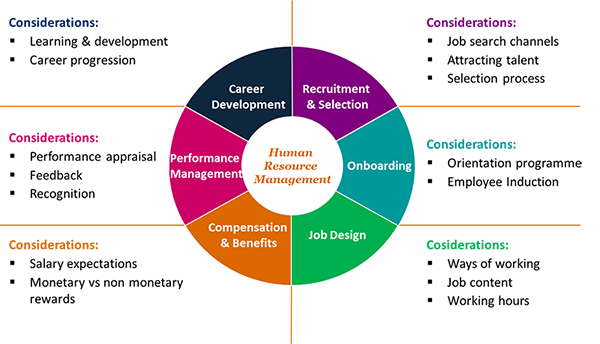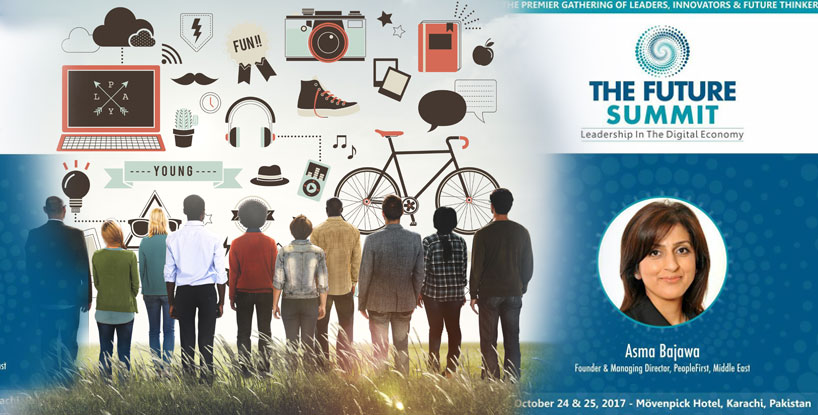Our Managing Director, Asma Bajawa, was invited to speak at a conference in Karachi, Pakistan in October. This conference, called The Future Summit, focused on the digital era and explored how leadership is likely to develop in the years to come. As one of the guest speakers and panel members, Asma spoke about Generation Z (people born between 1995 –2010) and how this future workforce is shaping up in Pakistan. The focus of Asma’s session was to help employers prepare for this upcoming generation of employees.
Building on our collaboration with the American University in Dubai (AUD) earlier this year, we decided to extend our research into Generation Z to include Pakistan. Our aim was to look closer into this generation and see if there were any significant differences between the UAE and Pakistan as an indication of cross country and cross-cultural differences. As a result, PeopleFirst conducted an online survey and face to face interviews of c200 Generation Z university students in Pakistan.
Our research found that there are no significant differences in the views and expectations of our sample of Generation Z, in Pakistan versus the UAE; in fact there were many similarities. This exercise led us to investigate further and understand more about the factors that have shaped and influenced this generation; what makes them tick and what are their expectations when it comes to the work place.
Generation Z, a generation of ‘digital natives’ have been shaped by a number of different factors such as globalization, which has a lot to do with how fast digital technology has spread and connected people across the world. They have lived their whole lives in an information age where they don’t need to wait for a response. The answers they want come to them immediately through smartphones and tablets. They prefer communicating in real-time, which is made easy for them through digital technology.
Generation Z has been brought up by Generation X and have spent their formative years listening to bad news about the economy. Some of them have seen their parents lose jobs and struggle to pay the bills and therefore, this has played an important role in shaping their thoughts on debt, fiscal planning and job security.
Moreover, having been exposed to constant news about global warming, Generation Z feels strongly about taking action to fix global issues rather than ignore them, which has shaped their thoughts on social responsibility. All this helps to explain some interesting facts about Generation Z as illustrated on the right.
Coming back to the conference, Asma also took into consideration some local issues in Pakistan that will impact what employers need to think about going forward:
- There has been a 50% increase in the number of female workers in Pakistan since 2000
- There is an increase in the number of students receiving higher education
- Technology has made processes more efficient
- Businesses don’t just serve local markets anymore, they go global
- Employment laws and working practices are evolving
Keeping in mind the expectations of Generation Z along with the evolving trends in Pakistan, Asma discussed HR initiatives that employers can take to attract and retain bright young talent. This covered the following areas:

1. Recruitment and Selection
- Employer branding matters! Employers should focus on CSR initiatives to attract young talent that care about your company’s cause
- CV screening may not be the most appropriate method of shortlisting as many young people have not worked before and therefore they do not believe a CV is the best way to shortlist them
- Games and face-to-face interviews along with a ‘’one-day trial’’ may be a good way to assess potential employees
2. Onboarding
- During the orientation process, employers should include information about the company’s internal culture and team rather than information readily available online
- The onboarding process should be interactive to help new joiners mingle and get to know their new colleagues
- Branded give-aways are a great idea as new joiners from Generation Z will definitely post a picture on social media which is great for employer branding
3. Job Design
- Allow them to take responsibility but be on hand to support and coach them if needed
- Assign a mentor, but don’t micro manage!
- Create an office environment that gives a sense of belonging and ‘my space’
- Consider flexible working options. Generation Z do not want to me be manged by the clock. They are happy to work hard and be stretched but don’t want to hang around if there is nothing to do
- Don’t exclude Generation Z just because they are new. They are happy to have a go so give them a chance
4. Compensation and Benefits
- Rethink your compensation and benefits packages as Generation Z would prefer a balance of monetary and non-monetary elements such as sports club memberships and travel opportunities which are little more unconventional
- Generation Z want to be recognized if they do good work so it will be important to have reward schemes that can give on the spot recognition
5. Performance Management
- Do away with annual appraisals. Instead, incorporate a mechanism for regular/continuous feedback conversations
- Provide feedback through face-to-face conversations where the focus should be on development and recommending ways to improve
- When they do well make sure you recognise and celebrate their successes and achievements
6. Career Development
- Generation Z definitely learn differently so offering a more diverse range of training options will be important
- Explore methods to provide training outside of the work space
Our insights into Generation Z have helped us to understand some of the specific needs of this generation and the potential benefits they will bring to the workplace. We cannot wait to see these changes start to take place in the organisations that we work with!


